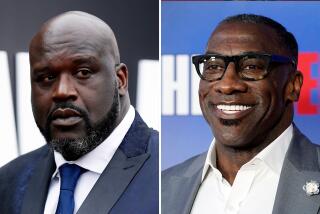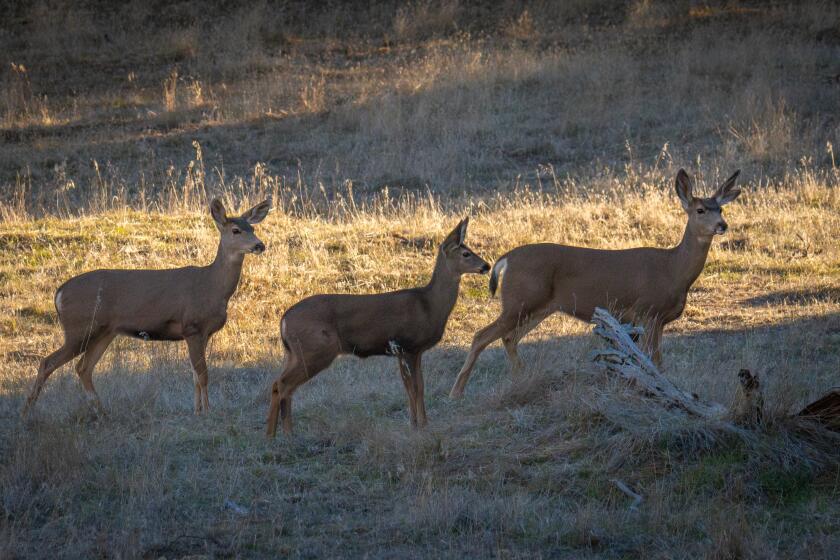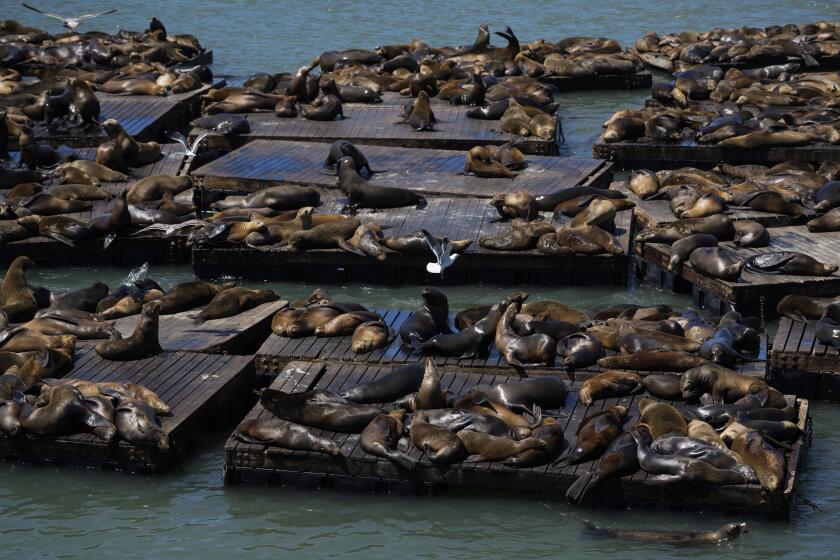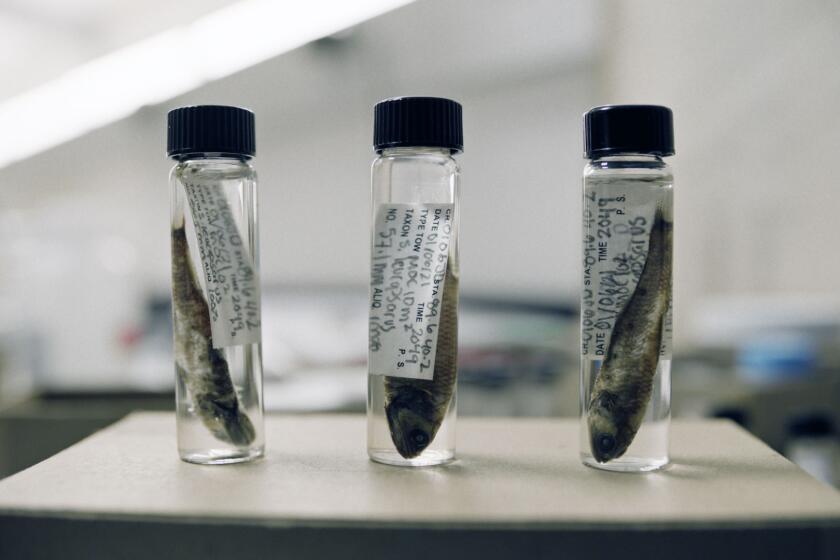Bayakoa Backers Seek Off Chance : Horse racing: Champion mare won’t get opportunity to become first female to win Big ‘Cap Sunday unless track is muddy.
Tom Tribolet, a veterinarian, was in Argentina scouting horses for C.N. Ray’s Evergreen Farm in the fall of 1987. That’s when Tribolet first saw Bayakoa, a 3-year-old filly with buckteeth and slightly crooked front feet.
She was no beauty queen, but she could run. In a mile stakes race against colts, Bayakoa beat them by 12 lengths.
“She looked like she was frightened when she ran,” Tribolet said. “She had a horrified look on her face.”
Now it is Bayakoa who frightens other horses, and sends fear through the hearts of their trainers. The 6-year-old mare, who won an Eclipse Award last year after nine victories in 11 starts, capped by the Breeders’ Cup Distaff at Gulfstream Park, has drawn only three opponents in each of her two races this year at Santa Anita, winning by a total of 9 1/2 lengths.
Bayakoa is used to seeing small fields. As word of her speed spread last year, no matter where she raced--Oaklawn Park, Hollywood Park, Del Mar, Belmont Park and Keeneland--few trainers wanted to take her on.
Should Bayakoa start Sunday, facing males for the first time since she ran in her native Argentina, the only reasons there will be a larger cast are (a) the Santa Anita Handicap is worth $1 million and (b) it’s still difficult, no matter how talented the horse, for females to beat males in this country.
But there will have to be a muddy track Sunday before trainer Ron McAnally will give Bayakoa the chance to become the first female to win the Big ‘Cap in its 53-year history. Three of Bayakoa’s 13 U.S. victories have come on off tracks, including a six-length victory in the Santa Margarita Handicap on Feb. 18. The forecast calls for a chance of showers Friday and Saturday.
She is probably better than this group of Big ‘Cap horses on any surface, but McAnally, 57, who has been training horses since 1958, is a conservative horseman and is looking at the broader picture. McAnally has seldom started a filly or mare against male horses, and if this is to be one of those rare occasions, he wants the timing perfect. The plan is for Bayakoa to face males eventually in a program whose objective is horse of the year, but it doesn’t necessarily have to be now.
No one can quibble over McAnally’s style. In the early 1980s, he orchestrated one campaign after another for John Henry, and the sore-legged gelding earned $6.5 million while winning seven Eclipse Awards, including two as horse of the year. McAnally saddled John Henry to win unprecedented consecutive Big ‘Caps in 1981-82.
It was McAnally who bought Bayakoa shortly after that 12-length victory in Argentina, paying $300,000 on behalf of Frank Whitham, the West Kansas banker-rancher who races the mare with his wife, Jan.
Tribolet was in Argentina at the same time as McAnally, but his offer of $150,000 for Bayakoa was considered about $200,000 too low.
“This wasn’t a filly from somebody’s back yard, a horse that nobody knew about, because there aren’t that many real good horses in Argentina,” Tribolet said. “She was in the limelight. She was the best filly there at a mile, and the best horse, period, at that distance.”
While McAnally was able to reduce the $350,000 asking price to the final $300,000 sale figure, these were amounts that Tribolet wasn’t prepared to pay.
“The mare gave no indication that she’d be able to run farther than a mile,” Tribolet said. “And to pay that much money for a horse with that limitation and then send her to California didn’t seem to make much sense. You know what they say about California racing: ‘Don’t worry about the lead, it’s already been taken, anyway.’ ”
Bayakoa’s buckteeth--called a parrot mouth in racing parlance--didn’t bother McAnally, but her toes pointing out were a concern.
“I told Ron that with an older horse, that shouldn’t make any difference,” Tribolet said. “In a young horse, that’s a consideration, but this filly was older, her joints looked good and tight and she obviously had taken to hard training.”
A parrot mouth bothers breeders the most, because it usually results in lower prices for their bloodstock.
“I’ve heard of people suing other people because they’ve bought themselves a horse with a parrot mouth,” said Jock Jocoy, a Del Mar veterinarian.
The progeny of parrot-mouthed horses may inherit the trait, which might reduce Bayakoa’s value as a broodmare one of these days, but there has never been much thought about retiring her from the track.
“She loves to run and she likes the environment of the track,” Frank Whitham said. “She’s completely sound, and although we do own a few broodmares, our main purpose is to run our horses.”
McAnally believes that front-running fillies such as Bayakoa have the best chance to beat colts, and the distaffers that have succeeded had similar styles--Regret, Twilight Tear, Mom’s Command, Lady’s Secret, Melair and Winning Colors, among others.
In the Santa Anita Handicap, there’s another front-runner, Ruhlmann, who bothers McAnally. “He has the kind of speed that could kill off the speed of our mare,” McAnally said.
In her last defeat, last September in the Chula Vista Handicap at Del Mar, Bayakoa didn’t get the chance to run her type of race. Going into the first turn she was squeezed badly by two other horses, didn’t make the lead and finished last, beaten by 15 lengths as Goodbye Halo won the race.
Bayakoa came back from the race with cuts on her rear left leg. Before the race, she was what trainers call “horsing,” an ovarian cycle with fillies that usually occurs about every 18 days.
Six weeks later, in the Spinster at Keeneland, no one ran with Bayakoa early, and she beat Goodbye Halo by 11 1/2 lengths.
“She’s tough to beat if she has her own way,” said Charlie Whittingham, trainer of Goodbye Halo. Whittingham, who has won a record seven Santa Anita Handicaps, will saddle Ruhlmann and Lively One, a late-running horse, Sunday.
Another question for Bayakoa is the 1 1/4-mile distance, which she has never run. Six of her victories have come at 1 1/8 miles, but jockeys who have ridden her--Laffit Pincay, who will be aboard Sunday, and Chris McCarron--have been impressed with the way she has finished. Bayakoa galloped out strongly for McCarron after both the Santa Maria Handicap on Feb. 4 and the Santa Margarita. And after one of her victories at 1 1/8 miles last year, Pincay said: “She finished very strong, and I didn’t even have to hit her.”
The last off track for the Big ‘Cap came in 1980, when Spectacular Bid won the race. He went on to horse-of-the-year honors, and if the forecast is correct, there could be the start of a similar story this weekend.
More to Read
Get our high school sports newsletter
Prep Rally is devoted to the SoCal high school sports experience, bringing you scores, stories and a behind-the-scenes look at what makes prep sports so popular.
You may occasionally receive promotional content from the Los Angeles Times.






